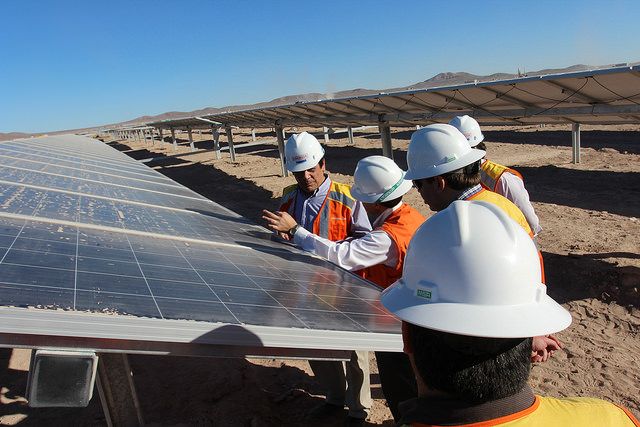Cheaper solar and electric vehicles (EVs) could snaffle 10% of the world’s fossil fuel market share within a decade, halting growth in demand for oil and coal by 2020, suggests a new report by the Grantham Institute at Imperial College London and the Carbon Tracker Initiative.
The study also suggests that most of the world’s big energy companies consistently underestimate the efficacy, flexibility and increasing low cost of solar PV and EVs – a shortsightedness that will undermine their “business as usual” approach as global demand for cleaner energy takes hold.
In analyzing the recent cost declines in solar – with modules falling to record-low prices in 2016 – the report calculates that fossil fuels will see around 10% of their typical market share lost to PV and electric cars within ten years.
This may not seem like a lot, but the report adds that when the U.S. coal mining sector lost a similar market share, it all-but collapsed. Indeed, between 2008 and 2013, Europe’s five major utilities lost more than $100 billion in value in the wake of an 8% increase in renewable energy deployment.
If solar PV can maintain the pace of cost reduction, the technology could supply 23% of the world’s power by 2040, said the report, rising to around 30% by 2050. In such a scenario, coal could be phased out completely, leaving natural gas accounting for just 1% of global power, augmented by extra wind and nuclear.
Popular content
For EVs, current adoption rates are likely to accelerate, leading to a 35% share of the road transport market by 2035. This would see oil and coal demand peak around 2020, with approximately two million barrels a day of oil displaced by 2025 and as much as 16 million barrels a day by 2040.
“There are a number of low-carbon technologies about to achieve critical mass decades before some companies expect,” said Carbon Tracker’s head of research James Leaton.
His colleague, Luke Sussams, added: “EVs and solar power are gamechangers that the fossil fuel industry consistently underestimates. Further innovation could make our scenarios look conservative in five years’ time, in which case the demand misread by companies will have been amplified even more.”
This content is protected by copyright and may not be reused. If you want to cooperate with us and would like to reuse some of our content, please contact: editors@pv-magazine.com.


1 comment
By submitting this form you agree to pv magazine using your data for the purposes of publishing your comment.
Your personal data will only be disclosed or otherwise transmitted to third parties for the purposes of spam filtering or if this is necessary for technical maintenance of the website. Any other transfer to third parties will not take place unless this is justified on the basis of applicable data protection regulations or if pv magazine is legally obliged to do so.
You may revoke this consent at any time with effect for the future, in which case your personal data will be deleted immediately. Otherwise, your data will be deleted if pv magazine has processed your request or the purpose of data storage is fulfilled.
Further information on data privacy can be found in our Data Protection Policy.